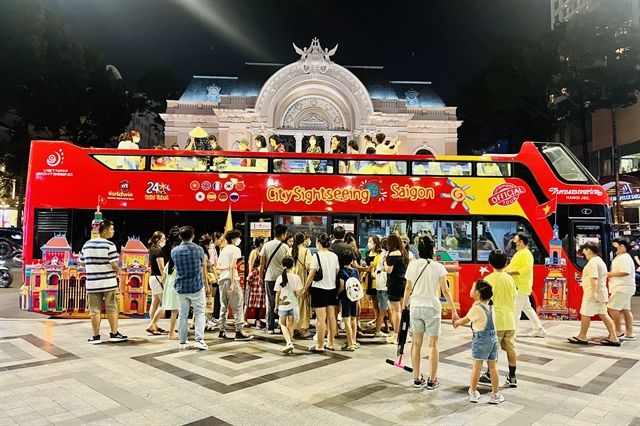 Society
Society

 |
| Tourists embark on a hop-on and hop-off bus in front of iconic HCM City Opera House located in the bustling downtown area. VNS Photo Bồ Xuân Hiệp |
HCM CITY — A new National Assembly resolution that grants increased autonomy to HCM City will help tackle many of the challenges it faces, experts have said.
Speaking at a seminar on Wednesday organised by Người Lao Động (Labourer) newspaper, Tô Đình Tuân, its editor-in-chief, said the resolution, set to take effect on August 1, would optimise resources for the development of the city and the southern key economic region.
The increased decision-making powers and resources would help the city address persistent challenges, especially related to infrastructure and institutional governance, he said.
The resolution would also provide the city with the necessary flexibility to swiftly allocate resources and prioritise infrastructure projects, helping alleviate congestion, improving transport systems and enhancing the quality of life, he added.
Bùi Hòa An, deputy director of the city Department of Transport, said around VNĐ266 trillion (US$11.28 billion) would be needed for infrastructure between 2021 and 2025.
Of this, VNĐ92 trillion would come from public funds while public-private partnerships (PPP) would contribute VNĐ174 trillion, he said.
Key ongoing projects in the city include Ring Roads 2 and 3 and renovation of the Xuyên Tâm and Tham Lương – Bến Cát canal systems, according to An.
Nguyễn Quang Thanh, deputy general director of HCM City Finance and Investment State-owned Company (HFIC), said the new resolution allows revenues generated from the equitisation of State-owned enterprises in the city to be appropriated by HFIC to increase its charter capital.
This would help subsidise interest rates under a loan stimulus programme financed by HFIC in priority sectors like education, healthcare, technology, and innovation, among others, he said.
Dr Trần Du Lịch, a member of the National Advisory Council on Financial and Monetary Policies, said in addition to infrastructure, the city also faces institutional governance challenges that hinder effective management and decision-making processes.
The current system often requires time-consuming co-ordination with national authorities, hindering local governments from implementing timely reforms tailored to their specific needs, he said.
The new resolution empowers local authorities to streamline administrative procedures, improve public services and implement innovative policies, he said.
New resolution
The resolution, which supersedes Resolution 54 passed in 2017, was approved by lawmakers last week.
It addresses investment, budget-finance, land administration, planning, and organisational structure, giving the city increased autonomy to utilise its resources for regional and intra-regional projects.
It supports the adoption of transit-oriented development and the transition from fossil fuel vehicles to clean energy alternatives, and promotes the use of public transportation to alleviate traffic congestion.
The city will have the authority to grant income tax exemptions and other breaks to individuals and businesses involved in innovation, science and technology start-ups.
The city can also have preferential policies to attract strategic investors in sectors such as chip manufacturing, and new materials and attract more investment in sports and culture through the public-private-partnership model.
It allows the city to initiate projects aimed at reducing greenhouse gas emissions through the carbon credit exchange, and retain 100 per cent of the revenues generated from carbon credit transactions. — VNS




